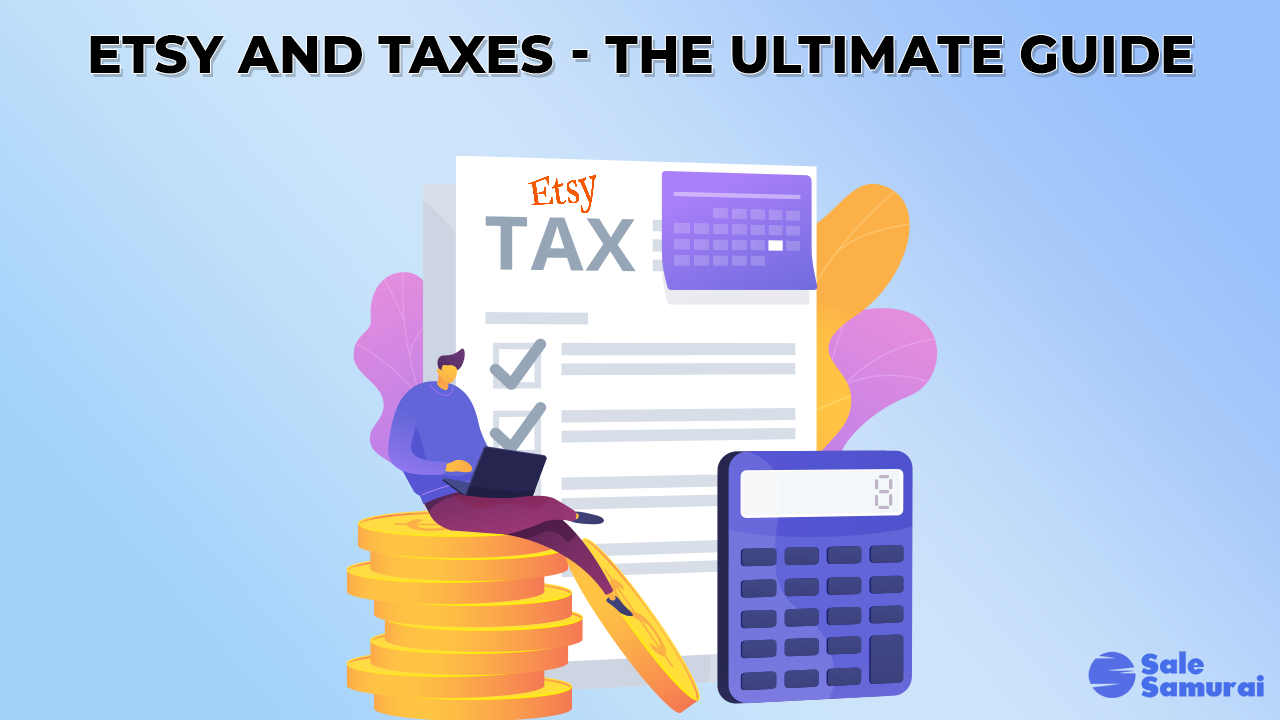
There’s probably no feeling quite like getting that first sale online for a hobby or passion after months of hard work. However, with that feeling comes an immediate realization that you may now have to pay taxes. Thus begins the endless loop that all business owners wish to avoid; happy about making a profit, realizing you now have to pay taxes. Unfortunately, Etsy sales are not tax-exempt, so here is our:
Etsy and Taxes – The Ultimate Guide
No, taxes are not fun, but they are necessary if you want to continue running a legal Etsy shop. Of course, filing for e-commerce taxes can seem daunting so we are going to make it as simple as possible in this article. Read below to find out how taxes work on Etsy, how to report taxes, your rate, and much more!
BIG NOTE: Just a heads up, we are not financial advisors or accountants, you should talk with a tax specialist before noting or acting on any of the information written in this blog post.
How To Report Income To The IRS As An Etsy Seller?
Let’s just jump right in without any sugar-coating because the truth is taxes are not fun, but they can be simple if you know what you’re doing.
The way you report your Etsy income will vary based on how you file your taxes. Some Etsy Sellers set up a business as an LLC and then pay themselves a salary. In that instance the LLC pays taxes and then you pay income taxes from the salary (This is if your LLC is set up as an S corp. Talk to your accountant!).
In other instances, the way you report income to the IRS will depend on whether you pay self-employee or sole proprietorship taxes.
We will get to all of that and more in this article. For now, know this:
Etsy will report your gross income to the IRS on Form 1099-K. The 1099-K tracks all payment card transactions which is the only way people can pay on Etsy.
You may not receive a 1099-K from Etsy. Unfortunately, that does not mean you are tax exempt, you still need to report Etsy income to the IRS.
Note that you will also have to file state income taxes in many states across the US.
How Much Money Do I Have To Make On Etsy To Be Able To File Taxes?
Depending on how you file your taxes, you could stand to make quite a bit of money before you are legally obligated to pay taxes. That being said, it is ALWAYS better to pay your taxes rather than find out you owe the IRS.
If you file the standard Form 1040, your taxes are due on April 15 of each year for the previous calendar year.
A form 1040 is the US individual income tax return, in other words, it’s the most basic tax form that most Americans file every year. Here’s the good news: Individuals below the age of 65 who are not claimed as a dependent don’t have to file form 1040 if they make less than $12,400.
If on the other hand, you are reporting self-employment tax, also known as Schedule SE, then the rules change quite a bit.
In this instance, you would have to report any amount of money you make over $400 to the IRS. Your Schedule SE filing will include Medicare coverage and Social Security taxes.
Luckily, you can subtract deductibles and credits from your adjustable gross income.
Finally, if you run your Etsy shop as a registered business but are the sole proprietor you need to complete a Schedule C or Schedule C-EZ form.
To qualify for a Schedule C-EZ:
- Your business expenses cannot be greater than $5,000
- Your business has no employees (it is a sole proprietorship)
- You have no inventory
- You are not using deprecation or deducting the cost of your home
That being said, most businesses on Etsy do hold inventory and tend to rent out their home working space to themselves so they would likely complete a Schedule C.
In general, once you make more than $400 on Etsy you should pay taxes.
Does Etsy Take Out Taxes For you?
As mentioned above, Etsy will report your earnings through a 1099-K, but it will not pay taxes for you or save a percentage of your revenue for tax purposes.
That part is completely on you! Read on to find out how to best keep track of Etsy income and expenses to avoid overpaying.
Also, keep in mind that Etsy will not report the taxes that they collect from buyers on the 1099-K form they issue to Sellers. Again if you do not receive a 1099-K you are still responsible for filing your taxes on your own.
If you are an Etsy Seller outside of the United States, Etsy will not issue a 1099-K.
How Do I Avoid Paying Taxes on Etsy
Ok, pay attention. You may want to take out a notepad and write this part down because it is super important.
Don’t!
You don’t ever try to avoid paying taxes on Etsy! Ever!
Trust us when we tell you that you won’t get away with it as it is highly illegal and the IRS has over 80,000 employees just waiting to audit small businesses.
Now, what you can do, which is in fact completely legal and something we encourage, is to keep track of all of your expenses and “write-off” anything you can!
Read below to find out how you can avoid overpaying on your Etsy taxes.
Does Etsy Give You A W-2?
Most handmakers transitioning from their full-time jobs to Etsy are probably used to getting a W-2 form from their employers.
Keep in mind that you should only get a W-2 if you are actually an employee but on Etsy, you are the boss! Sure, the e-commerce giant takes a small commission from sales, listings, and transaction fees but you are still in charge.
You are NOT an employee of Etsy. They don’t pay you a fixed or variable salary, you don’t get paid vacations from Etsy, and don’t have to clock in at 9.
Instead, your customers pay you through Etsy in exchange for the products you list on Etsy. If you have a solid shop and a trusted brand, then hey, you might be able to take a vacation and still have revenue coming in.
So no, Etsy will not give you a W-2, BUT if you are the one hiring, then it is your responsibility to give out W-2’s to your employees (or 1099s if you are hiring general contractors).
How Can I Avoid Overpaying?
That’s the million-dollar question now, isn’t it?
Let’s get down to what’s really on everyone’s mind which is: how do you avoid overpaying Uncle Sam?
It’s simple:
- Keep track of everything, and we mean everything!
- Everything is a write-off! (Well sort of…)
If you follow these two simple tips you will potentially avoid paying thousands in unnecessary taxes.
1. Keep Detailed Financial Records
This part may be annoying or downright difficult for most Etsy Sellers because they don’t have a background in book-keeping, so if you need to hire help, do so as it may end up saving you money.
Still, it’s a great skill to learn and do on your own especially if you are short on resources.
Open an Excel or Google Sheet and track all of your business spending day by day.
You can easily add all of this up and even track spending based on what exactly you are buying for your Etsy shop.
Include anything from material cost to Facebook ads, and your office space.
This brings us to our second point:
2. Deduct everything!
The old saying that everything is a write-off is pretty much true with some exceptions.
As a rule of thumb, anything even remotely connected to your Etsy shop can be deducted as a business expense which will save you tons on your taxes!
Filling up on gas to go shopping for vintage goods to sell in your shop? Deductible!
Buying lumber to make yourself a desk or heck straight-up buying a desk, paper, and other office supplies? Deductible!
Investing in a $300 painting to act as a backdrop for your Youtube channel where you review your Etsy store items? Yep, that’s a deductible also!
You can rent your garage out to yourself and count that as an expense or buy a private jet and go shopping for handmade jewelry around the world! Ok… obviously that last one is not realistic, but it is technically an expense.
Sure, no Etsy Seller is going to buy a jet, but it should give you an idea of everything that is potentially a deductible.
There are great tools like QuickBooks and TurboTax that can help you out with everything so definitely give those a try!
How Often Should I Pay My Taxes?
When you work a 9-5, your employer usually calculates your quarterly estimated taxes and then you have to pay them when tax season comes around.
When running a business, you sort of do things in reverse.
In other words, it’s up to you to estimate how much you will make per year which will determine how much you will pay each quarter.
If you think you will pay more than $1,000 for taxes this year, then you need to make quarterly estimated payments. The good news is that if you end up paying more you will get a refund.
You should pay estimated quarterly taxes through the IRS website. Here are the key dates to keep in mind:
- Payment due date for January 1-March 31: April 15
- Payment due date for April 1-May 31: June 15
- Payment due date for June 1-August 31: September 15
- Payment due date for September 1-December 31: January 15 of the following year
You will also have to file your Schedule C (or C-EZ) for last year by April 15.
Please don’t ever miss a year of tax payments. Oddly enough, it does happen but not only will it cost you hundreds in fines, it is also a major headache to go back and track earnings and expenses so make sure you pay on time every year.
What Kind of Taxpayer ID do I Need?
If you are a registered business, say an LLC, then you need an EIN or Federal Employer Identification Number to pay business taxes. Once you register your LLC, you can easily get an EIN number.
An EIN is also good to have if you want to open a business bank account or apply for credit.
As a sole proprietor, you would only need your Social Security Number (SSN) to file taxes but you can still get an EIN which will allow you to have a retirement plan, hire employees, and form an LLC.
Can I File Taxes on Self-Earned Income Without A 1099?
Absolutely! Again, Etsy may not send you a 1099-K, which is unlikely but possible, so it is up to you to file taxes on self-earned income.
Keep detailed records of earnings and expenses so as not to rely on Etsy’s 1099 form.
Who Is Exempt From Filing A 1099?
The following entities must file a 1099 if they make more than $600 in a year:
- Corporations
- LLCs
- General Partnerships
- Sole Proprietorships
Everyone else is exempt from the 1099.
How Much Can You Make On A 1099 Before You Have to Claim It?
In general, any income above $600 for non-employee compensation is reported on Form 1099-MISC. Similarly, $10 in broker payments or royalties are also reported on Form 1099-MISC.
As mentioned above, if you are self-employed you have to report any amount you make over $400.
That pretty much covers it! Taxes are no fun, but Etsy does make them slightly easier than if you were to run your own e-commerce platform and website.
Look on the bright side, the more you report on your taxes the better you will qualify for large business loans and lines of credit, so it’s not all bad. Just a reminder, we are not financial advisors nor are we accountants. You should consult with your accountant or tax specialist before filing your taxes.
If you are looking to massively grow your Etsy business this year contact us today to find out how we use real-time data and metrics to find high-volume, actionable keywords your competitors are not using!
Did you know the average Sale Samurai user has increased their listing visibility by 180%?
Sale Samurai Team
Sale Samurai is your all-in-one tool for massive Etsy growth. With thousands of users and years of e-commerce experience, Sale Samurai is built by sellers with the data and analytics in mind that you need for a successful Etsy shop. Start with a free account to explore how Sale Samurai can help expand your business today.







